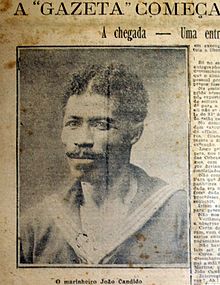João Cândido Felisberto
| João Cândido Felisberto | |
|---|---|

Newspaper "Gazeta de Notícias" published December 31 1912
|
|
| Personal details | |
| Born |
24 June 1880 Encruzilhada do Sul, Rio Grande do Sul, Brazil |
| Died | 6 December 1969 (aged 89) Guanabara, Rio de Janeiro, Brazil |
| Cause of death | Cancer |
| Nationality | Brazilian |
| Occupation | First Class Sailor |
João Cândido Felisberto (born on 24 June 1880 in Encruzilhada do Sul, Rio Grande do Sul, Brazil, and died on 6 December 1969) was a Brazilian sailor, best known as the leader of the 1910 "Revolt of the Lash". Sometimes quoted as simply "João Cândido" or "Jean Candido" in foreign articles.
João Cândido Felisberto was born to a poor Afro-Brazilian family. His father and mother were former slaves. He entered the Brazilian Navy in 1894 at the age of 13.
The conditions for Brazilian sailors at the time were harsh, and being black, Felisberto suffered prejudice from the white officers in the Brazilian Navy. Several Brazilian sailors had been sent to Newcastle-Upon-Tyne in England during the two year period taken for the construction of the dreadnought Minas Geraes. João Cândido arrived there in September 1909 and left in January 1910 as part of the crew of the newly commissioned Minas Geraes. It was while experiencing the living conditions and increased freedoms of Newcastle that João Cândido realised how unacceptable conditions in the Brazilian Navy were.
The sailors had many secret meetings in Rio de Janeiro, planning a strategy to stop the corporal punishment still imposed in the new Navy, which had received two new modern battleship in 1910 .
In November 1910, the flogging of a sailor, against Navy regulations (250 strokes instead of the allowed 25 strokes), was a contributing factor to the revolt, known in Brazil as "Revolta da Chibata" ("Revolt of the Lash"). Sailors took control of two Brazilian battleships, Minas Geraes and São Paulo, both built in England, as well as two other major warships. Their demands included the abolition of torture as a form of punishment and improved living conditions in the Brazilian Navy. João Cândido was the leader of the movement. The new Brazilian president, Hermes da Fonseca, promised the end of "Chibata" and approved an amnesty, but the government later went back on this promise. In the revolt's aftermath Felisberto and many of his follower mutineers were either arrested, tortured or murdered in prison. Felisberto himself was tortured, and also contracted tuberculosis, but he recovered after some months and was eventually released. The Brazilian press nicknamed him "Almirante Negro", or the "Black Admiral", for his actions.
...
Wikipedia
